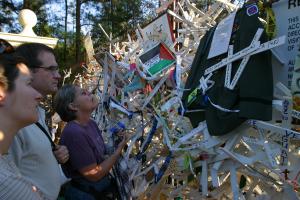Issue Date: December 19, 2003
At Fort Benning, retired officer returns symbol of 23-year career Hanging on the fence of the closed gate separating Fort Benning from city of Columbus, Ga., property was a neatly pressed U.S. Army uniform, replete with various medals, with a one-page typed note pinned to it. The uniform belonged to retired Army Lt. Col. Byrne Sherwood Jr., a career officer and Airborne Ranger who won a Bronze Star for combat service during the Vietnam War. Sherwood, 55, an active Catholic who calls the late Archbishop Oscar Romero his hero, decided to return his uniform as an act of protest against the U.S. Army School of the Americas (now known as the Western Hemisphere Institute for Security Cooperation), where Latin American soldiers are trained. In the past, many of those officers have been implicated in human rights violations and murder in their native countries. Romero was murdered in 1980 while saying Mass. He had spoken out against injustice and military excesses in El Salvador. Sherwood is a public high school history teacher from San Francisco’s East Bay Area who accompanied a dozen Richmond High School multimedia students on a cross-country trip to the annual protest. It was during the solemn funeral procession held Nov. 23 that Sherwood stopped at the fence to hang his uniform. Despite a 23-year military career, Sherwood said he decided the time had come for him to make a strong statement in opposition to U.S. militarism. Returning the uniform was a symbolic rejection of the life he had led and a way to send a message, Sherwood said. “I had the ability to say something that maybe others couldn’t say in the hopes that those on the other side of the fence would look at this [uniform] and say, ‘Wow, Airborne Ranger, combat veteran, you know. What’s going on?” To some extent that’s what happened. When military police tore down the memorial, the soldiers did not toss Sherwood’s uniform into the dump truck they used for everything else. Minutes before the memorial was torn down, Fr. Bill O’Donnell, a priest from California who knows Sherwood, read aloud the statement the former soldier had attached to his uniform. (Editor’s note: O’Donnell died Dec. 8 at his home in California. See accompanying story for more information.) “It is with regret and sorrow that I return my uniform to you, for in doing so I am handing back most of my adult life with all of its hopes, dreams and aspirations,” Sherwood wrote. “Fort Benning, the infantryman’s home, is where I learned the art and science of war; is where I became a Ranger and a paratrooper. Fort Benning is where I returned at intervals to hone my skills and prepare for the next level of command. “What happened? When I retired from the Army and entered civilian society, my first reaction was ‘Is this what I have been defending?’ I was struck by the greed, selfishness and materialism of our society. I also began to see in a new way what U.S. foreign policy is all about. When I was a soldier, my interest in world affairs did not extend beyond wanting to know where I might be deployed to and what the mission might be. After I retired and was freed from the narrow focus of a soldier, I began to see a systematic pattern of U.S. foreign policy that sponsors and supports repressive right-wing regimes around the world. “These regimes are typically sympathetic to our worldwide corporate interests and materialistic lifestyle, and in many instances promote human rights abuses against labor organizers, clergy and anyone else who gets in the way of the corporate agenda. I realized that I had not been a soldier of democracy but, to use the words of two-time Medal of Honor winner, Gen. Smedley Butler (U.S. Marine Corps), ‘I was a racketeer for capitalism.’ “Now, all I can say is ‘Not in my name.’ Not in my name will these things be done.” Of his action, Sherwood said, “I felt sad. I loved it, and I was hanging up half my life and most of my adult life. Every old soldier I guess keeps his uniform and takes it out and looks at it every now and then. It was hard and it was sad for me.” He was in the military from 1970 to 1993, and it wasn’t until he retired that he began to change his views. “I didn’t have an experience like Paul,” said Sherwood, who now considers himself a pacifist. “I describe it like a kaleidoscope. When you first look in, you just have all these jumbled pieces in there and then you twist it and everything falls into place. “Once I was away from it and was able to look at it, everything just kind of fit into a pattern and it became very clear to me what our country does and what I was basically a part of.” -- Patrick O’Neill National Catholic Reporter, December 19, 2003 |
